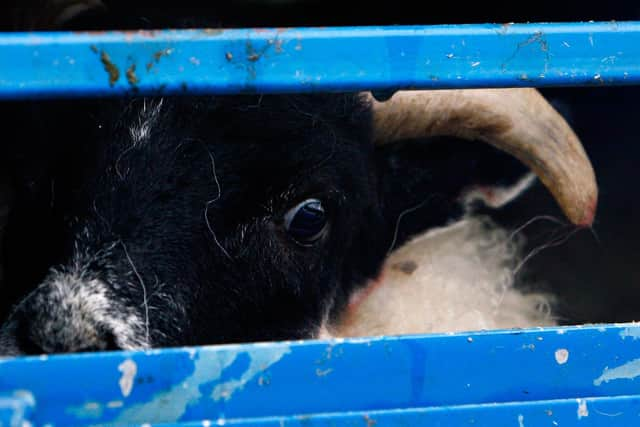Live animal exports: UK Government just dropped its planned ban on practices that belong in the Dark Ages – Philip Lymbery
I could scarcely believe it. Last month, the UK Government dropped its Animal Welfare (Kept Animals) Bill and, consequently, its manifesto commitment to ban live animal exports, dashing the hopes of a self-proclaimed nation of animal lovers. Two years ago, the UK Government announced with much fanfare that it was going to end the decades-long practice of sending sheep and lambs on horrifically long journeys, simply to be slaughtered on arrival.
It would have finally drawn a line under the practice of sending baby calves on journeys that they are just too young for, only to end up in veal farms that all too often still have standards so low they’d be illegal in Britain. Now, hopes of ending this trade have been shattered.
Advertisement
Hide AdAdvertisement
Hide AdLive animal exports very much hit the headlines during the mid-1990s when the major ferry companies refused to carry calves, sheep and other animals destined for horrendously long journeys abroad for slaughter or fattening. It started a nationwide scramble by exporters to find airports and seaports willing to facilitate the continuation of the trade.
It meant that what had hitherto been out of sight, out of mind, was now trundling through community streets. People could hear and smell the calves and sheep packed into lorries. They could sense their fear. They could see the pitiful eyes of suffering animals looking out from stark trucks. It led to people from all walks of life protesting in their thousands at iconic flashpoints such as Brightlingsea, Shoreham, Dover, and Coventry airport, from which animals were being exported.
Dehydration, hunger and death
Let’s be clear, in an age of refrigerated lorries, there really is no excuse for sending animals on long journeys simply to be slaughtered at the journey’s end. Far better for animals to go to a local abattoir and then the meat be exported. In fact, that’s what happens now with most meat exports anyway.
So, why carry on with a live export trade that causes so much suffering through overcrowding, distress, exhaustion, dehydration, hunger and even death? Positive steps have been seen recently in other countries, notably New Zealand and Brazil. New Zealand banned live animal exports earlier this year. And more recently still, a Brazilian court banned the export of live cattle from the country's ports. Positive progress that you’d think the UK would want to emulate.


But rather than leading the way like New Zealand and Brazil, the UK has abandoned its much-vaunted commitment, replacing it with a vague pledge to propose a ban in a separate Bill at some unspecified future date. By backtracking on its promise, the UK Government has quite simply dropped the ball on animal welfare and stamped it into the ground.
Live animal exports have been a stain on British farm animal welfare standards for far too long. The eyes of a nation of animal lovers are once again staring at the UK Government, this time in disbelief. Compassionate citizens everywhere will be willing this country to rediscover its conscience and end the outdated nightmare of live animal exports once and for all.
Philip Lymbery is chief executive of Compassion in World Farming, a former UN Food Systems Champion and an award-winning author. His latest book is Sixty Harvests Left. He’s on Twitter @philip_ciwf
Comments
Want to join the conversation? Please or to comment on this article.
